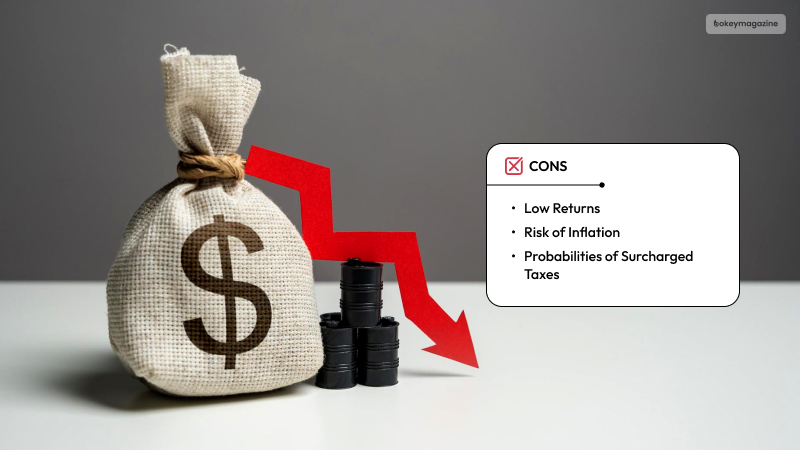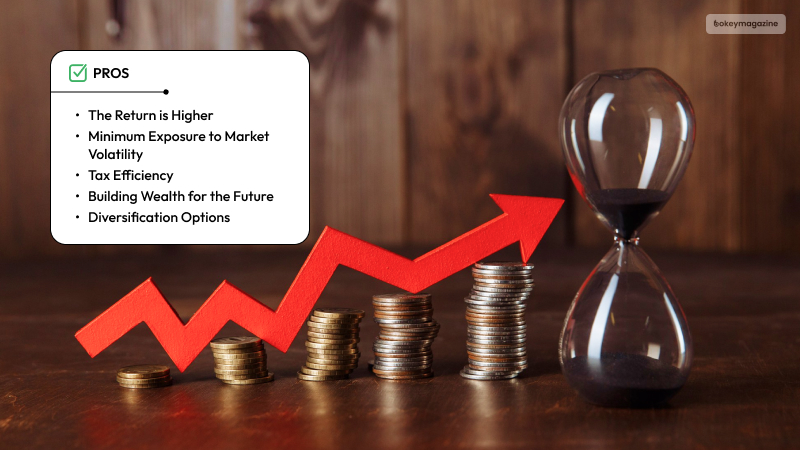
Is It OK to Choose Short-term Over Long-term Investments?
One of the earliest decisions an investor must make regarding investing involves choices between short-term vs long-term investments.
These are strategies which differ in the rewards they offer as against risks. Knowing when to go for one against the other affects your financial goals, risk tolerance, and overall portfolio performance.
This post explores short-term vs long-term investments, how to decide between them, and whether it’s all right to favor one. By the end of this post, you will have a clearer idea of which investment approach might best suit your particular needs.
What Are Short-Term and Long-Term Investments?

Before the jargon, let us first define what a short-term and long-term investment is because they actually explain the disadvantages and advantages.
Short Term Investments
Short term, normally investments usually refer to the type of financial assets that are normally anticipated to be held for a very short period, usually below one year.
Normally, such investment types are liked by investors looking for quick returns or whose liquidity is usually needed over a short period. Short-term investments usually tend to have fewer risks than long-term investments but usually achieve lower returns.
Some of the most common short-term investment types include the following:
Money Market Funds
Extremely liquid, low-risk investments with a relatively modest return. Time horizons with short-term savings apply these funds.
Certificates of Deposit (CDs)
Maturity periods that may reach as few as several months to up to one year, and CD features the fixed return attraction.
Treasury Bills (T-Bills)
Government securities are sold at a discount and later redeemed at face value. It is low-risk and short-term in nature.
Short-Term Bonds
Debt instruments are termed these bonds. The maturity periods of the same are within one to five years. Fixed returns accompany the bonds but generate risk because they are interest-rate sensitive.
Equity/Stocks or ETFs (Short Period)
People are trading in stocks and ETFs and are eagerly waiting for earnings because of market volatility in the short term.
Long Term Investments
However, long-term investments are held for a protracted period, usually five years or more. Investing for the long term is to gradually accumulate wealth and enjoy compound returns over time.
A good long-term investor must be patient since long-term investing usually involves holding onto assets during turbulent market periods. This is to enjoy returns that may be realized in several years or decades.
Some of the general long-term investment categories are:
Equities:
Growth company shares are sought for a long-term portfolio because equities tend to appreciate, making them either generate capital gains if sold or dividend income at the time of sale.
Bonds:
Long term bonds of US treasury or corporate bonds can help a portfolio realize their full value, as holding the investment until maturity yields a rather predictable income flow.
Mutual Funds and Index Funds:
These funds collect money from different investors to invest it in a diversified pool of stocks, bonds, or other assets. For long-term investors, such funds diversify and give constant returns.
Real Estate:
For the most part, investment in properties is considered a long-term affair since real estate markets usually appreciate with time. Rental properties or real estate investment trusts might provide capital appreciation and/or income for the long term.
Retirement Accounts (e.g., 401(k), IRA):
Tax-deferred accounts are long-term investments that aim to save and grow your wealth for retirement.
Short-Term vs Long-Term Investments: Pros and Cons

Considering everything above. However, here is a summary of the pros and cons of short- and long-term investing so you can better understand how you may go about it.
Pros of Short-Term Investments

Here are a few pros of having short-term investments, that you should know about before investing.
1. Liquidity and Accessibility
Liquid in nature typically defines a short-term investment. This gives the opportunity for liquidation without loss of value in monetary terms.
It is ideal for investors who may require liquidation within a relatively short term. For instance, if you are saving for a house, your short-term investments would allow you to save up the amount needed to buy the house quickly.
2. Less Risk
In contrast, short-run investment is relatively less risky than long-run investment. Assets like money market funds, treasury bills, or short-term bonds tend to be stable with predictable returns.
Since the investment is for the short run, there is a limited period for market fluctuations to affect your asset value.
3. Suitable for Specific Financial Goals
Short-term investments are appropriate for specific short-term financial objectives. You place some money as a reserve for a holiday, your sister’s wedding, or an emergency fund through short-term investments. Thereby earning some yield while keeping funds relatively safe and liquid.
4. Suitable for Risk-Averse Investors
Short-term investments present a lower risk to the risk-averse investor or those who prefer conservative investments. It has the dual function of capital protection and soft returns generation.
Cons of Short-Term Investments

Before investing in short-term investments, here are a few cons that you need to evaluate before you think of investing your hard earned money.
1. Low Returns
The problem with short-term investments is that they have much lower returns than long-term investments. Because short-term investments are low-risk and highly liquid. They do not have the same scope for growth as the alternatives – stocks or real estate – do.
2. Risk of Inflation
With very low interest, even a short investment period may not beat the inflation rate. In saving the capital, you’ll likely end up losing purchasing power with time if the return does not stay abreast of the increases in cost of living.
3. Probabilities of Surcharged Taxes
More tax is levied for short term investments than the investments made in the long term. For instance, the gains realized from holding an investment for less than one year are mostly taxed using the ordinary income tax rates.
Therefore, the income tax rates could be relatively much higher than the long-term capital gains tax on investments that have been held for more than one year.
Pros of Long-term Investments

There are a lot of pros when it comes to investing in long term investments, so here are a few of them that you should know about.
1. The Return is Higher
Most of the time, long-term investments will get a much greater return in the long run, primarily because of compounding. Compound growth is something long-term investors can benefit from by reinvesting their dividends, interest, or capital gains, thereby having their money work for them.
2. Minimum Exposure to Market Volatility
Of course, short-term movements of the market could create short-term effects on an investment. But less so for a long-term investment. The market trends upward while correcting itself at times; therefore, for a long-term investor, it becomes possible to ride above the market downturn and maximize the uptrend.
3. Tax Efficiency
Long-term investments tend to be more tax-efficient than short-term investments. For example, long-term capital gains- income from investments held for more than one year- are taxed at a lower rate than short-term gains.
In addition, long-term investments in retirement accounts such as IRAs and 401(k)s have tax-deferred growth where individuals delay paying taxes until retirement.
4. Building Wealth for the Future
Long-term investments are also appropriate for those who intend to save money over many years, retirement or college for a child. Such investments can grow significantly over many years and help the investor achieve large goals that will be realized in the future.
5. Diversification Options
Ideally, long-term investment represents diversified portfolios across several asset classes, including stocks, bonds, real estate, and alternative investments. Long-term portfolios of this kind involve less risk but promise higher returns in the long term.
Cons of Long-Term Investment

Investing money for a longer period can be quite risky. Before you go for investing for a long-term investment here are a few cons that you should be aware of.
1. Illiquidity
Long-term investments tend to be illiquid. If the investor needs liquidity, he is charged penalties or compelled to liquidate investments at losses. Some examples include selling stocks at depressing prices or taking money from a retirement account before some specified minimum age. Hence suffering unfavorable consequences.
2. Greater Risk
While the long-term investment is quite minimal for changes in the short volatility term. It is susceptible to risks associated with the market.
For example, significant fluctuations can be observed in equities; therefore, the amount of time it would take to lose before gaining may be quite daunting for those who do not like risk. Such people may not be able to tolerate the cut from the market.
- Time-consuming
They invest for a long time since results can be very slow at the end of it all. Short-term investment gives faster results, but long-term investment has a process that takes all those years to get to maturity.
Choosing Short-Term vs Long-Term Investments
The selection between investment in a long-term or a short-term is something of the investment option according to the needs of each person’s financial goals and risk tolerance over the investment time horizon. Let’s think about it in this way:
- If you have goals in the near term-for example, buying a car, paying for a wedding, or building up an emergency, short-term investments are probably your best bet. The kind of goals that have a clear cut-off date and typically need their money available sometime soon.
- Long-term investments are suitable for long-term goals, such as funding retirement, your child’s education, or building wealth generationally. They generally yield much better returns and compound your growth over time.
1. Evaluate Your Risk Appetite
If you are a conservative who doesn’t like to see a lot of activity in your portfolio, then short-term investments would more likely suit you. If you can stomach more market fluctuations for a potentially higher return. Long-term investments will more than likely meet your risk tolerance requirements.
2. Liquidity Needs
A short-term investment will be more suitable if you need liquidity and easy access to your funds. In contrast, if you do not necessarily draw from your funds anytime soon and can patiently stay to a long-term strategy, the long-term investments provide greater growth through compounding.
Wrapping Up!
Debate of short-term vs long-term investments, there is no one-size-fits-all answer. Both strategies should be part of a diversified portfolio and are suited to the appropriate choice dependent on the individual’s financial goals, risk tolerance, and time horizon.
Short-term investments provide liquidity and stability and are appropriate for near-term goals and conservative investors. Long-term investments give one the chance of getting higher returns and can build wealth over an extended period and carry much more risk and less liquidity.
Instead, most investors require an approach balancing their immediate needs and positioning them for growth. Guided by a proper assessment of their financial situation and goals. They should be able to develop an investment strategy that maximizes security in the short term while fulfilling long-term goals of growing wealth.
For More Interesting Articles Click Below!!!



















Post Your Comment